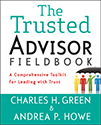This post is part of our Weekly Tips series.
He was late by nearly an hour—delayed by others during his prior meeting, which apparently was a doozie. Most leaders would put their game face on, glide in with a brief apology (or not), and proceed to give their talk. This CEO didn’t do that.
Instead, he came to the front of the room, greeted everyone, and said, “I hope you’ll bear with me for a few minutes. I’m winding down from another meeting.”
He said it with humility and quiet confidence. It was a simple, authentic gesture.
Within no time, it was clear he was fully present for the group. And I believe the messages he subsequently delivered were more poignant and powerful because they were delivered by a CEO who also happened to be a fellow human—prone to stressors and distractions like the rest of us, only unlike most of us, willing to admit them.
This CEO’s transparency is a form of improv, which I’ve been writing a lot about lately. It’s “thinking out loud,” which you can practice, too. Feeling distracted? Say something briefly about that. Concerned about the impression you’re going to make? Acknowledge it, with your own humility and quiet confidence.
You’ll get focused and be more accessible as a result—qualities that help build trust in any relationship.
Make It Real
This week, think about leaders you’ve experienced who are powerful presenters. What made them memorable for you? What traits might you emulate?
Learn More

- Discover how leaders can make it safe for people to try new things, or learn about transparency as a marketing tool Chapter 11 of The Trusted Advisor Fieldbook: A Comprehensive Toolkit for Leading with Trust.
Andrea Howe
Latest posts by Andrea Howe (see all)
- Why choosing silence in the face of awkwardness can be a trust tragedy - March 21, 2024
- What NOT to do when you think you’re being ghosted - February 21, 2024
- Reprise: If you’ve resolved to have better client relationships this year, great, now ditch your resolution - January 2, 2024
